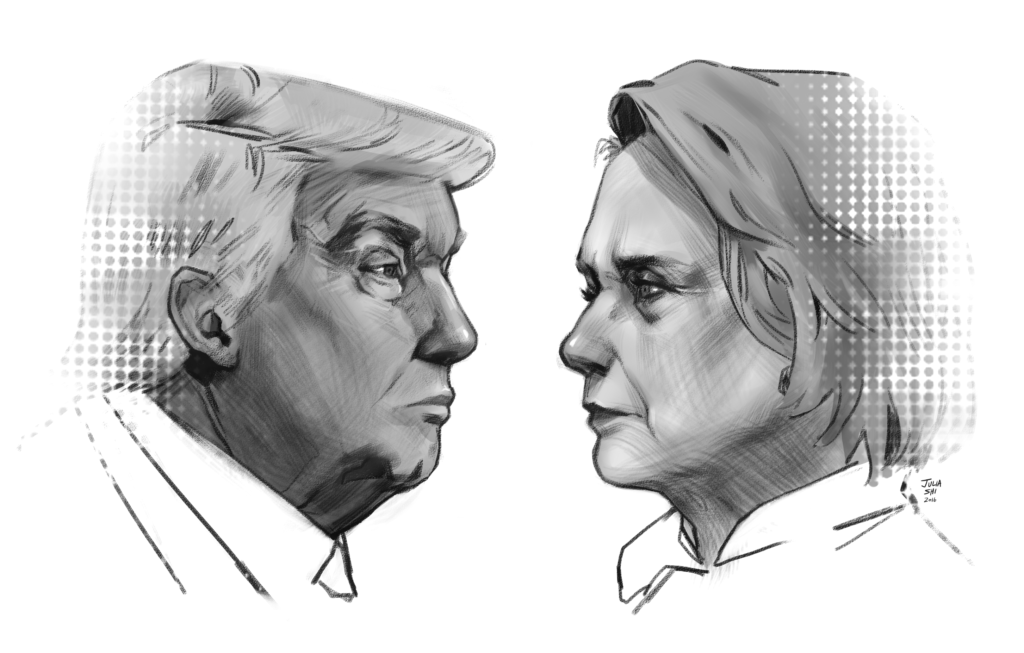After long feeling largely absent in everyday buzz on campus, the presidential race seemed to finally arrive at Yale last Monday, when candidates Trump and Clinton LAW ’73 clashed in the first presidential debate. Arriving as an international freshman, I was expecting the election — which arguably is the most unique of its kind in modern times — to be more pervasive in campus conversation. I was therefore surprised to find that its turmoil had barely had any presence on campus until now. However, it’s easy to explain why: an overwhelming majority favoring one side simply is not fertile grounds for political debate. In the News’ polling of the class of 2020, Clinton supporters outnumbered Trump supporters by a factor of thirteen, and it is safe to assume that the trend follows across the other three classes. In other words, Yale is pretty liberal.
Social psychologist and NYU Professor Jonathan Haidt ’85 once caused a stir in psychology circles with a string of claims regarding the liberal skew in academia, which should come as no surprise. Haidt also brought to attention that political partisanship is a strong source of prejudice toward strangers.
This raises some vital points for discussion: is the atmosphere at Yale truly open to all opinions and arguments? In the wake of Monday’s debate, the forum “Overheard at Yale” was overflowing with posts ridiculing the Republican candidate. While I personally authored such a post and reveled in its positive reception, it also made me stop to think: how might such a tide affect students who support Trump — and are these students met by reasonable listeners when voicing their views? To be sure, the problem is not the mere existence of a liberal predominance in the student body. Rather, it’s how the popular discourse streamlines toward liberal views. Francis Bacon, the pioneer of the scientific method, said: “The human understanding, once it has adopted opinions … draws everything else to support and agree with them.” Should we not strive to overcome this fallacy — especially at a reason-driven place like Yale? Liberals pride themselves on tolerance and champion the cause of personal rights when it comes to gender, sexuality and religion. Is it not then the ultimate hypocrisy to deny conservatives the opportunity to be heard?

While it can be argued that student discourse should reflect the predominant sentiment, the case becomes even stronger when looking at faculty behavior. If my Economics professor provides an analytical assertion that Trump’s economic plan would have concrete consequences for society, I’m okay with that. Sometimes the objective truth just leans toward one side of the spectrum. However, if my Psychology professor were to make an off-hand joke about George W. Bush ’68 when lecturing on narcissistic personality disorders, I would find it problematic. Again, my case is not against political satire in general, which I think is both entertaining and essential. Rather, my argument is that faculty should consider their positions of authority when proclaiming their political leanings in teaching environments.
At this point, I feel like I should disclaim that I am on the far left of the political spectrum. The very fact that I’m compelled to include this disclaimer, because I simply don’t want to risk people thinking that I’m conservative, is in itself supporting my point. While I probably disagree with nine out ten conservative political causes, I also believe that freedom of speech cuts both ways. I hope for my right-wing peers to be able to express their views without the fear of social ridicule from students and faculty.
So as we approach the final stages of the presidential race, I urge that all of us, no matter our political convictions, Yale students exhibit the greatest measures of tolerance. But let us extend that tolerance to people who hold different ideological beliefs than we do. If not for our conservative friends, then we should listen because nearly every great scientific and societal development has come from a challenge of conventions. Failing to listen kills progress.
Continue to have your opinions as you are entitled, but remember that bipartisanship is a virtue and that we learn the most from those with whom we most disagree.
Joshua Monrad is a freshman in Saybrook College. Contact him at joshua.monrad@yale.edu .
Illustration by Julia Shi.







